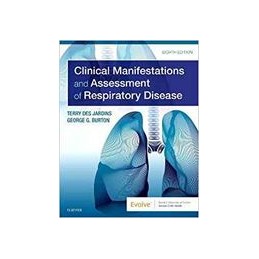- Obniżka


 Dostawa
Dostawa
Wybierz Paczkomat Inpost, Orlen Paczkę, DHL, DPD, Pocztę, email (dla ebooków). Kliknij po więcej
 Płatność
Płatność
Zapłać szybkim przelewem, kartą płatniczą lub za pobraniem. Kliknij po więcej szczegółów
 Zwroty
Zwroty
Jeżeli jesteś konsumentem możesz zwrócić towar w ciągu 14 dni*. Kliknij po więcej szczegółów
A realistic look at treating respiratory diseases! Clinical Manifestations and Assessment of Respiratory Disease, 8th Edition gives you a fundamental knowledge and understanding that is required to successfully assess and treat patients with respiratory diseases. Using a unique organization of material, this full-color text is divided into three distinct areas which show you how to first gather clinical data, then formulate assessments, make objective evaluations, identify desired outcomes, design a safe and effective treatment plan, and finally document all steps. With easy-to-follow language and relevant clinical scenarios, you will gain a firm understanding of why certain treatment modalities are applied. New to this edition is a chapter detailing Respiratory Insufficiency in the Patient with Neuro-Respiratory Disease, along with revised content which takes a deeper dive into latest developments, research, and practices and protocols in the treatment of respiratory disease.
Opis
PART 1: Assessment of Cardiopulmonary Disease SECTION I: Bedside Diagnosis
1. The Patient Interview 2. The Physical Examination 3. The Pathophysiologic Basis for Common Clinical Manifestations
SECTION II: CLINICAL DATA OBTAINED FROM LABORATORY TESTS AND SPECIAL PROCEDURES-Objective Findings
4. Pulmonary Function Testing 5. Blood Gas Assessment 6. Assessment of Oxygenation 7. Assessment of the Cardiovascular System 8. Radiologic Examination of the Chest 9. Other Important Tests and Procedures
SECTION III: THE THERAPIST-DRIVEN PROTOCOL PROGRAM-THE ESSENTIALS
10. The Therapist-Driven Protocol Program 11. Respiratory Insufficiency, Respiratory Failure and Ventilatory Management Protocols 12. Recording Skills and Intra-Professional Communication
PART II: Obstructive Lung Disease
13. Chronic Obstructive Pulmonary Disease, Chronic Bronchitis and Emphysema 14. Asthma 15. Cystic Fibrosis 16. Bronchiectasis
PART III: Loss of Alveolar Volume
17. Atelectasis
PART IV: Infectious Pulmonary Disease
18. Pneumonia, Lung Abscess Formation and Important Fungal Diseases 19. Tuberculosis
PART V: Pulmonary Vascular Disease
20. Pulmonary Edema 21. Pulmonary Vascular Disease: Pulmonary Embolism and Pulmonary Hypertension
PART VI: Chest and Pleural Trauma
22. Flail Chest 23. Pneumothorax
PART VII: Disorders of the Pleura and of the Chest Wall
24. Pleural Effusion and Empyema 25. Kyphoscoliosis
PART VIII: Lung Cancer
26. Cancer of the Lung: Prevention and Palliation
PART IX: Environmental Lung Diseases
27. Interstitial Lung Diseases
PART X: Diffuse Alveolar Disease
28. Acute Respiratory Distress Syndrome
PART XI: Neuro-Respiratory Disorders
29. Guillain-Barre Syndrome 30. Myasthenia Gravis 31. Respiratory Insufficiency in the Patient with Neuro-Respiratory Disease
PART XII: Sleep-Related Breathing Disorders
32. Sleep Apnea
PART XIII: Newborn and Early Childhood Cardiopulmonary Disorders
33. The Newborn Disorders 34. Pediatric Assessment, Protocols, and PALS Management 35. Meconium Aspiration Syndrome 36. Transient Tachypnea of the Newborn 37. Respiratory Distress Syndrome 38. Pulmonary Air Leak Syndrome 39. Respiratory Syncytial Virus Infection (Bronchiolitis) 40. Chronic Lung Disease of Infancy 41. Congenital Diaphragmatic Hernia 42. Congenital Heart Disease 43. Croup and Croup-like Syndromes: Laryngotracheobronchitis, Bacterial Tracheitis and Acute Epiglottitis
PART XIV: Other Important Topics
44. Near Drowning/Wet Drowning
45. Smoke Inhalation, Thermal Injuries, and Carbon Monoxide IntoxicationTentative (based on current edition)
Appendix I Symbols and Abbreviations Commonly Used in Respiratory Physiology Appendix II Agents Used to Treat Bronchospasm and Airway Inflammation Appendix III Antibiotics Appendix IV Antifungal Agents Appendix V Mucolytic and Expectorant Agents Appendix VI Positive Inotropes and Vasopressors Appendix VII Diuretic Agents Appendix VIII The Ideal Alveolar Gas Equation Appendix IX Physiologic Dead Space Calculation Appendix X Units of Measure Appendix XI Poiseuilles Law Appendix XII PCO2/HCO3_/pH Nomogram Appendix XIII Calculated Hemodynamic Measurements Appendix XIV DuBois Body Surface Area Chart Appendix XV Cardiopulmonary Profile Appendix XVI Answers to Self-Assessment Questions
Glossary Index
Indeks: 31039
Autor: Terry Des Jardins
